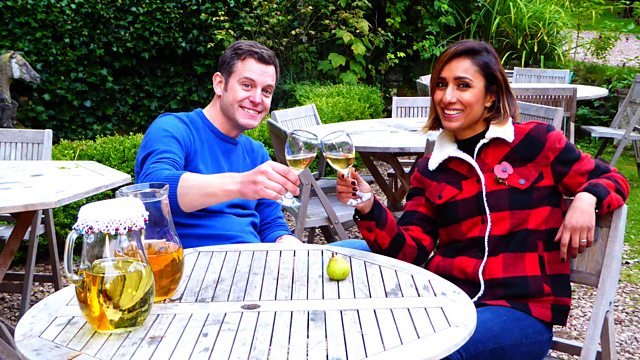
Herefordshire
Matt looks at Herefordshire's historic perry-making industry and helps out with the pear harvest. He starts out at Weston's, the world's biggest producers of perry.
Matt and Anita are in Herefordshire. Matt looks at the county's historic perry-making industry and helps out with the pear harvest. He starts out at Weston's, the cider makers, who are the world's biggest producers of perry. Then he travels to the 12th-century Hellen's Manor, where some of the rarest and oldest pear trees in the world are to be found. He gathers a sack full and heads to meet self-styled 'ciderologist' Gabe Cook, a man who likes cider but loves perry even more. Together they make perry the old-fashioned way - on a stone grinding wheel with lots of elbow grease.
Anita is at a farm where time has stood still. She recounts the story of Birches Farm and farmer Alfred Price through the diaries he kept. She also visits the last traditional clog maker in Herefordshire to see clogs being made the time-honoured way.
Joe Crowley is with PhD student Charlotte Selvey, who is using caterpillars made of modelling clay to find out what birds are present in the county's ancient orchards. The birds leave beak impressions in the fake caterpillars, which identifies them.
Tom's looking at the appalling conditions endured by some workers on the high seas, conditions which many have described as slavery.
And Adam is on the farm where they're harvesting bracken for fuel.
Last on
More episodes
Previous
Perry

Matt Baker is in Herefordshire where the pear harvest is in full swing. Matt meets Richard Moyse of Westons, the only large scale producer of traditional perry, based in Much Marcle. Westons is still run by the great grandchildren of its founder Henry Weston. Matt sees batches of pears being delivered ready for processing and gets on top of the oak vats which were originally bought by Henry Weston and are nearly 200 years old but are still used today to ferment perry and cider.
Birches Farm

Anita Rani is in Herefordshire near the border of Wales on Birches Farm, a farm that is very firmly stuck in the past. Anita delves into a treasure trove of old diaries written by the previous owner Alfred Price and dating back to the 1920s. She meets Jimmy Morgan, who worked the farm with Alfred and features in his diaries. Birches Farm is now owned by the Herefordshire Wildlife Trust and Anita meets Reserve Manager Jim Light and finds out what hay smells like!
Modern slavery

Tom Heap meets up with a group of Filipino men who have been freed from slave like conditions on a British registered fishing trawler. Sadly their case isn’t an isolated one, though it is rare and on the fringes of the industry, foreign workers once at sea can find themselves in unsafe and unpaid conditions. Tom later joins up with the UK Border Force as they use new powers to try to put an end to this appalling crime.
Orchard ecology

Joe Crowley is at Broome Farm near Ross-on-Wye where he meets its owner, cider and perry maker Mike Johnson. The trees are bountiful with apples and pears but pests often threaten the crop and Mike has some innovative ideas to benefit his orchard and control pest numbers naturally. Joe finds out how bats, modelling clay and sheep can all help.
The Ciderologist

Matt meets Gabe Cook, self-styled ciderologist, who champions old fashioned farmed perries and the rare and different varieties of pear that make them. They visit the grounds of ancient Hellens Manor which has an avenue of rare perry pear trees, planted in 1710 to commemorate Queen Anne’s Coronation. Matt then has a go at harvesting pears himself and soon discovers it can cause quite a headache!
British clogs

Anita is in Kington, a small town which has everything you would expect, butchers, bakers, green grocers… and a traditional hand carved clog maker, Jeremy Atkinson. British clogs are unique in the world of clogs because they are carved to fit the feet. Anita finds out how he uses traditional hand tools to carve a stump of sycamore into bespoke clogs. She gets to try on a pair, but will they fit?
Bracken harvest

Adam’s looking at invasive weeds. Ragwort can be a particular problem as it’s poisonous and poses a real risk to animal health. But one invasive species has truly ancient roots and that’s bracken. Fossil records indicate that it dates back 55 million years, so it has adapted to survive in lots of habitats. There’s 2.5 million acres growing wild across Britain and in some parts of the country it is a major problem. Adam visits a farm on the Mendips hills in Somerset, where bracken is being harvested and put to a good use.
Traditional perry making

Matt has a wheel barrow full of perry pears and all he needs now is somewhere to mill and press them. The team at Hellens Manor in Much Marcle are on hand to show him the traditional methods. Caitlin Morgan talks him through the process whilst Matt and some of the staff power the old mill. The whole process would normally take 5 months but luckily Matt doesn’t have to wait that long to try some.
Credits
| Role | Contributor |
|---|---|
| Presenter | Matt Baker |
| Presenter | Anita Rani |
| Presenter | Joe Crowley |
| Presenter | Tom Heap |
| Presenter | Adam Henson |
| Executive Producer | William Lyons |
| Series Producer | Joanna Brame |
